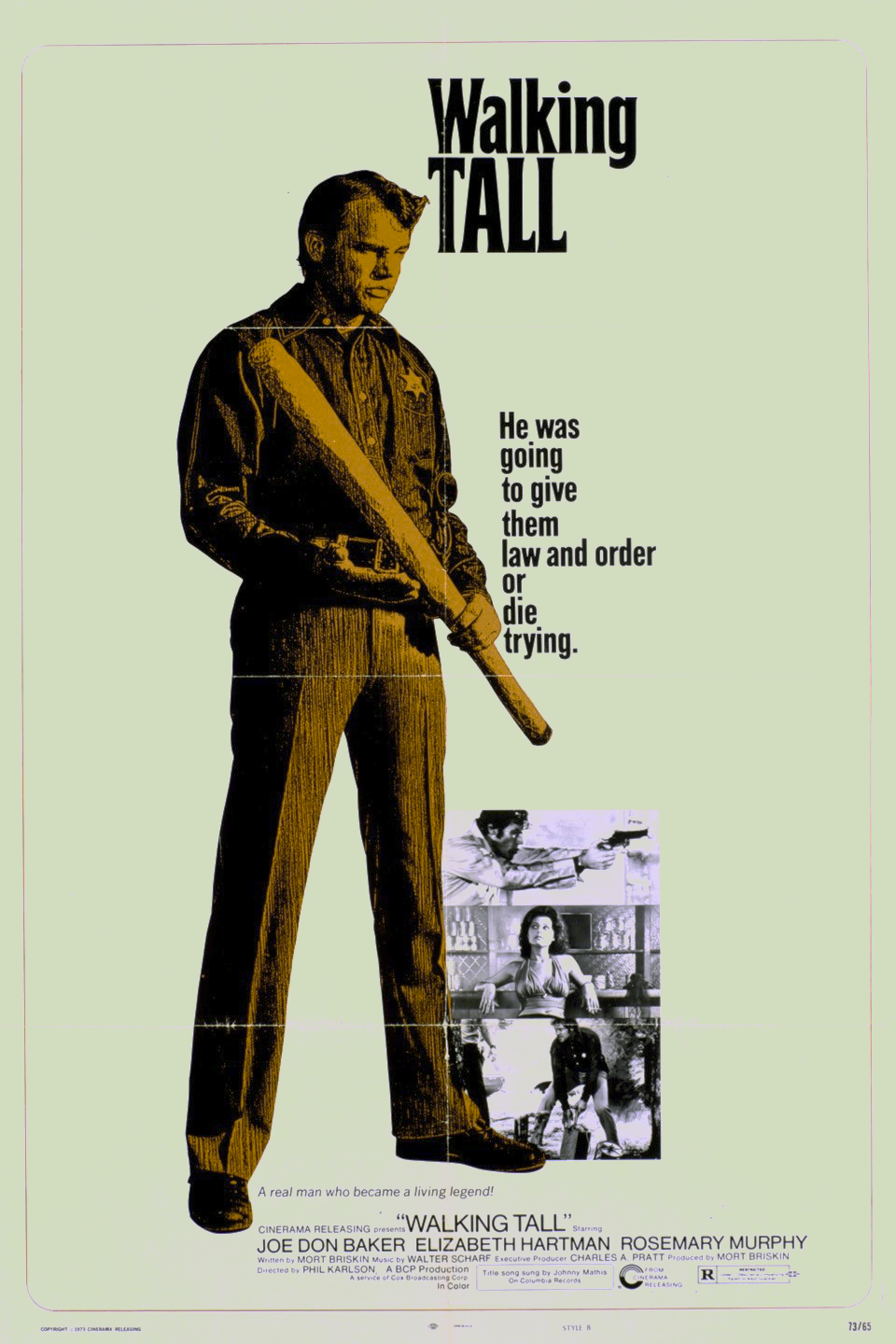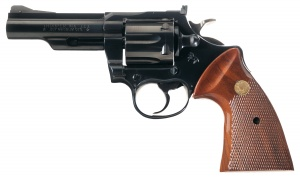Anyone who knows me knows 70s films have my favorite aesthetic. Whether it be the way the film looks, the lighting, the way blood looks. All of those apply to WALKING TALL. The story is also really interesting. In so many other films a cop with a family tends to drag the movie down rather than prop it up. In this I found the family drama and dynamic just as interesting as the cop investigations and action. It also allows Joe Don Baker as Buford Pusser to be a three dimensional character. He's tough, vulnerable, and capable all at once. The southern small town setting makes it feel like a western and a prohibition era film at times, only making it more interesting.
Synopsis: Based on the life of Tennessee sheriff Buford Pusser, who almost single-handedly cleanup his small town of crime and corruption, but at a personal cost of his family life and nearly his own life.
I liked the scenes early on showing Buford moving back home, seeing his wife, seeing his kids, and seeing his home. Also seeing the truck he had on the road during his wrestling career. The truck that has "Buford the Bull" written on the side. Seeing him work on logging, and having moments with his family makes him relatable. The film turns really quick, as Buford and his friend Lutie go to The Lucky Spot around 30 minutes in and this is when he gets into a fight with the gamblers who he knows have been cheating. We see Buford's strength but also his wrestling background in this fight as he uses numerous grappling moves, kicks, and elbows to dispatch his attacks until they all gang up on him.
There are a lot of relevant socio cultural moments throughout. Buford hiring Obra (Felton Perry) to be his deputy was an interesting choice. They had been seen being friends at the logging business before the attack when Buford helps Obra get a job. Buford not only motivates Obra to be a better lawman. Buford goes to him at one point asking him for help to find illegal moonshiners and Obra is reluctant at first. Buford makes the point that whenever you can do something to actually help your people you won't do it. Later on Obra has a moment where he has to confront rowdy white men creating a ruckus in a black bar. Obra asks Buford for help and Buford says you can handle it on your own. Obra makes the point that because he is black in a Tennessee small town that he could get killed just for arresting white men. Buford does realize this and when he makes his way to the bar Obra has cuffed the main offender and has his short torn open. A genuine moment was seeing this white man actually apologize for his behavior the next day. Buford later gets some info from Luan (Brenda Benet) a woman who was eying him at THE LUCKY SPOT. He tells her to leave town to be safe and they have a nice moment where she seems to really like Buford but respects his marriage enough to not make anything else happen. Moments like these can be cut of films to preserve pacing, but at the same time real intimate moments like this make a movie better on a dramatic level.
I enjoyed seeing both Felton Perry and Bruce Glover in this as deputies. Felton played Harry Callahan's (Clint Eastwood) partner in MAGNUM FORCE. Bruce Glover played Mr. Wint in DIAMONDS ARE FOREVER
The character of Buford Pusser is heroic in many ways. The way he garners support to be Sheriff is interesting. I enjoy his defiance of the corrupt sheriff and judge by showing off his scars in court, something separate from the actual court case but uses it to gain empathy from the jurors and exposing the town's corruption by saying that could happen to anyone if things don't change. The judge making his bail $50,000 in combination with wanting to give him life imprisonment only makes us root for Buford, and against the corrupt townies more. The corrupt and incompetent previous Sheriff tries to run Buford over at one point, instead driving his car off a bridge. Buford saves the Deputy, Grady Coker's (Bruce Glover) life and Grady stands by him the rest of the film. You see different cookouts he has with the men at his home, you see all of them going on raids for the illegal moonshiners. His usage of the long 2X4 as his main weapon instead of a gun also made him fun to watch. When Buford and Obra arrest the moonshiners I had mentioned earlier Buford never has a search warrant or reads them their rights. Something that makes him a flawed character, but also he spends that night reading the whole entire lawbook. The next day he trolls a corrupt judge by putting toilets in his office saying he gets to make the decisions of where people's offices go. Buford gets stabbed, shot, and threatened many times throughout this film and never compromises his morals, never gets scared, and never asks for gratitude. That makes the ending of this film all the more powerful. I haven't wanted to stand up and clap watching a film many times by myself but when this was over I wanted to. I can imagine many people seeing this in a theater in 1973 did stand up and applaud.
The family dynamic actually gave this film more drama. A lot of cop films where family is involved can either work well or just drag the film down. THEY CALL ME MISTER TIBBS is a film where it doesn't work. TIGHTROPE is a film where it does. There are many powerful moments with Buford and his family. His son Mike (Leif Garrett) has a great moment where he shows up to the hospital with his rifle wanting to guard his father after he is shot. His wife Pauline (Elizabeth Hartman) seems against Buford becoming Sheriff, but their relationship never gets argumentative or annoying. You can tell that Buford can't spend enough time with his family, especially when he gets called away on Christmas. There is a sad moment where the house is attacked, Buford kills the assailant but their dog is killed in the process. Their reaction to that moment felt real from all the actors involved. After Buford is shot the first time he only picks up a gun to go with his hickory club at the urging of Pauline. The ending only makes the family dynamic more important and more tragic. Something that happens toward the end reminds me of the ending to ON HER MAJESTY'S SECRET SERVICE where you are really surprised at what you just saw.
Another aspect to this film I like is how it transcends genre. The time it was made, the small town location both in setting and filming location, and the plot makes it feel like a modern western and a prohibition movie. The stuff involving illegal distilleries made it feel like prohibition. The gambling den, combined with a town of criminals with guns and a lack of law and order made it feel like western. The small town culture of racism and blue collar workers also makes it feel like it was from a different time, but not really. In the 1960s and 1970s small towns in the south were still like this. The civil rights era had just passed. Films like IN THE HEAT OF THE NIGHT also gave me the same feeling this did. While "hixsploitation" is a term one could use for this film, the true story element makes it feel more genuine than that.
The red lighting in THE LUCKY SPOT, the one awesome looking blood squib where Buford shoots Callie (Rosemary Murphy) right inside of the eye, and all the paint and ketchup looking blood is something I loved. The 70s films are the only ones with that kind of aesthetic, those kinds of blood squibs and that kind of violence. There are car chases aplenty, shootouts, and enough hickory club beatings to satisfy any action fan. There is one awesome explosion and this occurs when Buford is taunting one deputy who betrayed him by telling all the criminals in town when the cops were going to conduct their raids and searches. He makes Virgil (Ted Jordan) crawl to get away from a building before it explodes.
The family dynamic makes the film more dramatic but at the same time inflates the runtime. As do some of the character scenes. The 1970s violence and the fact that some of this stuff actually happened only makes the film more resonant.
Rating: 9/10
Trivia: The real life Buford Pusser actually wanted Bo Svenson to portray him in the film. Bo Svenson was unavailable at the time of filming so Joe Don Baker was chosen. Joe Don Baker was unavailable for the sequels so Bo Svenson was then chosen to take over the role.
Gun of the movie: When Buford starts carrying a gun, he carries a Colt Trooper Mk III .357 magnum revolver.








No comments:
Post a Comment